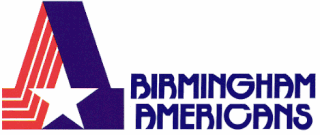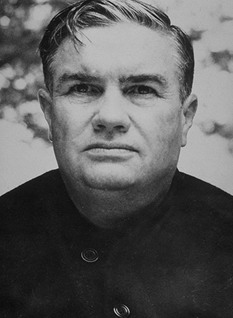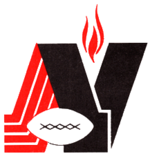
Tuscaloosa is a city in and the seat of Tuscaloosa County in west central Alabama. Located on the Black Warrior River at the Atlantic Seaboard fall line of the Piedmont, it is the fifth-largest city in Alabama, with an estimated population of 101,129 in 2019. The city was originally known as Tuskaloosa until the early 20th century.

The Birmingham Americans were a professional American football team located in Birmingham, Alabama. They were members of the four-team Central Division of the World Football League (WFL). The Americans, founded in late December 1973, played in the upstart league's inaugural season in 1974. The team was owned by William "Bill" Putnam, doing business as Alabama Football, Inc.

Legion Field is an outdoor stadium in the southeastern United States in Birmingham, Alabama, primarily designed to be used as a venue for American football, but occasionally used for other large outdoor events. Opened 94 years ago in 1927, it is named in honor of the American Legion, a U.S. organization of military veterans.

The Birmingham Vulcans were a professional American football team located in Birmingham, Alabama. They were members of the five-team Eastern Division of the World Football League (WFL). The Vulcans, founded in March 1975, played in the upstart league's second and final season in 1975. The team was owned by a group of Birmingham businessmen with Ferd Weil as team president.

Kenneth Michael Stabler, nicknamed "Snake", was an American professional football player who was a quarterback in the National Football League (NFL) for the Oakland Raiders (1970–1979), Houston Oilers (1980–1981) and New Orleans Saints (1982–1984). He played college football for the Alabama Crimson Tide. Stabler quarterbacked the Raiders to victory in Super Bowl XI, was the 1974 NFL Most Valuable Player and was selected as a quarterback for the NFL 1970s All-Decade Team. Stabler was posthumously elected to the Pro Football Hall of Fame in 2016.
The Birmingham Fire were a professional American football team based in Birmingham, Alabama. They were a member of the North American West of the World League of American Football (WLAF) and played their home games at Legion Field. The club was a charter member of the WLAF, and was under the ownership of Gavin Maloof. Led by head coach Chan Gailey, the Fire saw moderate success as they compiled an overall record of twelve wins, nine losses and one tie (12–9–1) and made the playoffs in both seasons they competed. The franchise folded in September 1992 when the NFL placed the league on an indefinite hiatus.

Frank William Thomas was an American football player and coach. He served as the head football coach at the University of Chattanooga from 1925 to 1928 and at the University of Alabama from 1931 to 1946, compiling a career college football record of 141–33–9. During his tenure at Alabama, Thomas amassed a record of 115–24–7 and won four Southeastern Conference titles while his teams allowed an average of just 6.3 points per game. Thomas's 1934 Alabama team completed a 10–0 season with a victory over Stanford in the Rose Bowl and was named national champion by a number of selectors.
John Anthony Copeland is a former American college and professional football player who was a defensive end in the National Football League (NFL) for eight seasons. He played college football for the University of Alabama, was recognized as an All-American and was a member of a national championship team in 1992. He was drafted by the Cincinnati Bengals in the first round of the 1993 NFL Draft, and he played his entire pro career for the Bengals.
Johnny Musso is an American former football player, a running back for three seasons with the BC Lions of the Canadian Football League and in the National Football League with the Chicago Bears.
David Lee Palmer is a former American college and professional football player who was a running back and kick return specialist in the National Football League (NFL) for seven seasons. He played college football for the University of Alabama, where he was an All-American and a member of Alabama's 1992 national championship team. A second-round pick in the 1994 NFL Draft, he played professionally for the NFL's Minnesota Vikings.
Edward Joseph Salem was an American football quarterback and defensive back. He was a 1950 College Football All-America Team selection from the University of Alabama Crimson Tide and played one season for the National Football League's Washington Redskins and one season for the Canadian Football League's Montreal Alouettes.
Dennis Frank Homan is a former professional American football wide receiver in the National Football League for five seasons for the Dallas Cowboys (1968–1970) and the Kansas City Chiefs (1971–1972). He later played for the Birmingham Americans (1974) and Birmingham Vulcans (1975) of the World Football League.
Matthew Reed is an American former gridiron football player. He played professionally as a quarterback in the World Football League (WFL) and the Canadian Football League (CFL).
The 1910 Alabama Crimson Tide football team represented the University of Alabama in the 1910 college football season. It was the Crimson Tide's 18th overall and 15th season as a member of the Southern Intercollegiate Athletic Association (SIAA). The team was led by head coach Guy Lowman, in his first year, and played their home games at the University of Alabama Quad in Tuscaloosa and the Birmingham Fairgrounds in Birmingham, Alabama. They finished the season with a record of four wins and four losses.
The Vulcan Bowl was a college football bowl game played at Rickwood Field in Birmingham, Alabama. The game was played on New Year's Day between 1941 and 1949 and again in 1952, between historically black colleges and universities (HBCUs). The game was one of the longer-lasting bowls for HBCUs established in the 1940s. The first game in the series was called the "Steel Bowl," and the bowl game served as an early era black college football national championship game by matching the Southern Intercollegiate Athletic Conference champion against the best team from the other HBCU conferences.
The 1986 Alabama Crimson Tide football team represented the University of Alabama in the 1986 NCAA Division I-A football season. It was the Crimson Tide's 94th overall and 53rd season as a member of the Southeastern Conference (SEC). The team was led by head coach Ray Perkins, in his fourth year, and played their home games at both Bryant–Denny Stadium in Tuscaloosa and Legion Field in Birmingham, Alabama. They finished the season with a record of ten wins and three losses and with a victory in the Sun Bowl over Washington.

John Mitchell, Jr. is an American football coach and former collegiate player. Over the course of his career, Mitchell has broken several racial barriers, one of which was being the first black player for the Alabama Crimson Tide. Currently, he is the assistant head coach of the Pittsburgh Steelers in the National Football League (NFL).
The Bear Bryant Show was a weekly coaches' show that served as a weekly recap of the Alabama Crimson Tide football team's previous day's game. The show ran during the tenure of head coach Paul "Bear" Bryant from the 1958 through the 1982 seasons. Co-hosted by John Forney (1961–1965), Bill Austin (1966), Charley Thornton (1967–1981) and Steadman Shealy (1982), The Bear Bryant Show was a cultural phenomenon within the state of Alabama that contributed to the rise in popularity and awareness of the university's football program during the 1960s and 1970s. The show ran for an hour during its entire run.
The 1975 World Football League season was the second and last season of the World Football League. The 1975 season was to be an 18-game season over a twenty-week schedule.
Sports in Birmingham, Alabama include several minor league professional teams and college sports. The city of Birmingham and the Birmingham metro area have no major professional sport franchises. The Birmingham area is home to the Birmingham Barons, the AA minor league affiliate of the Chicago White Sox, which plays at Regions Field in the Southside adjacent to Railroad Park. The University of Alabama at Birmingham has a popular basketball program, and Samford University, located in Homewood, has basketball and football teams. The Hoover Metropolitan Stadium in the suburb of Hoover is home to the Southeastern Conference Baseball Tournament which drew more than 108,000 spectators in 2006. There is also an amateur soccer association, known as La Liga. The Birmingham area also hosts the Alabama Alliance basketball and Tragic City Rollers roller derby teams.







